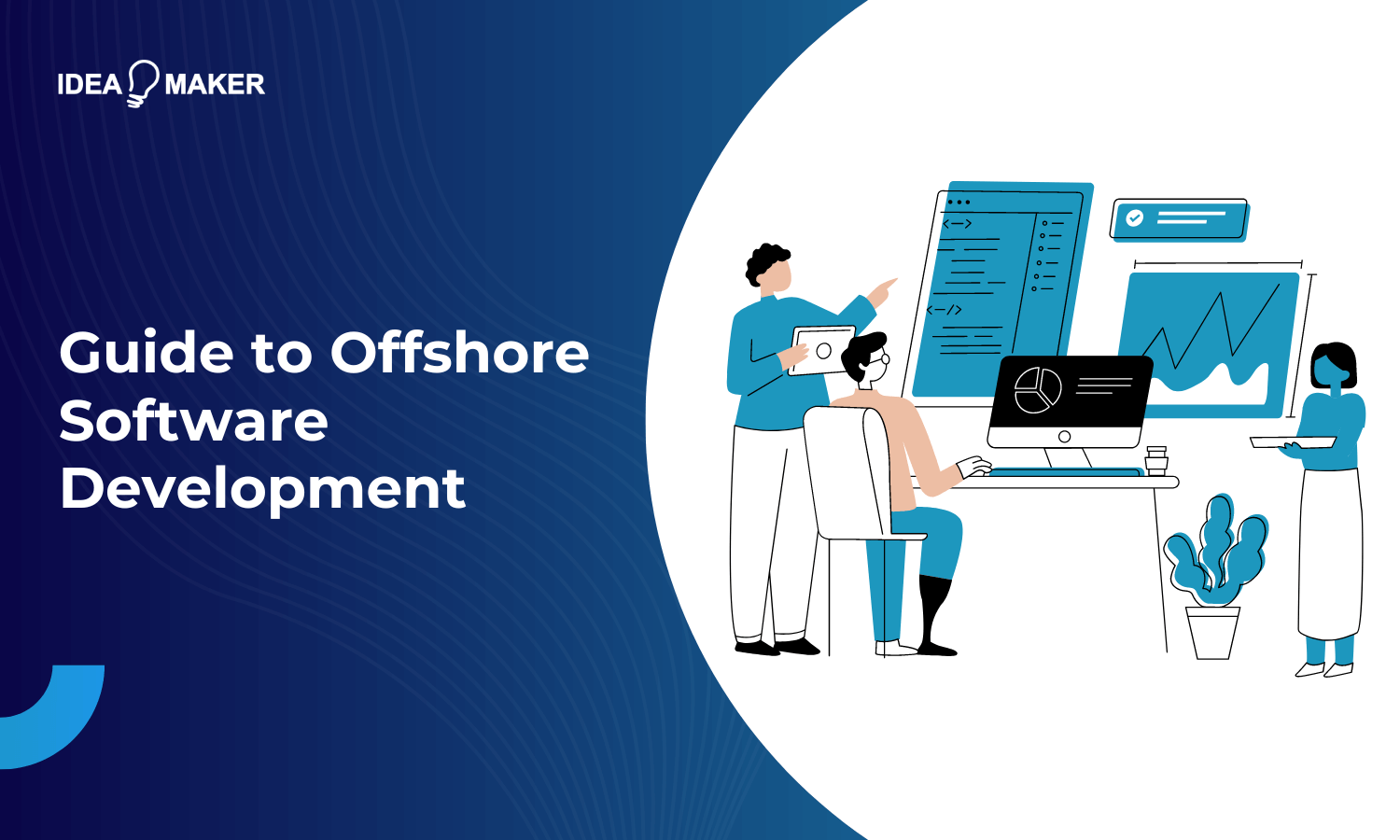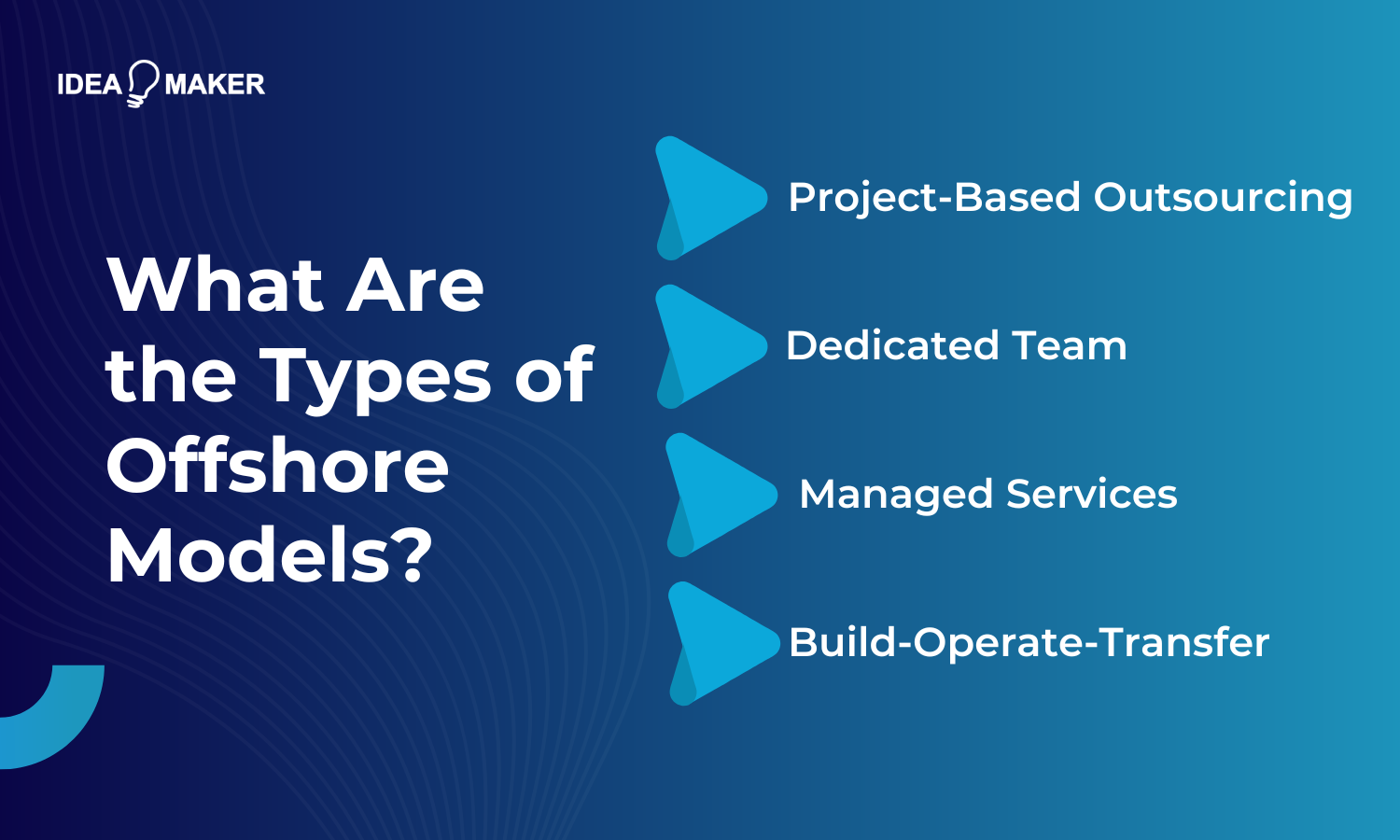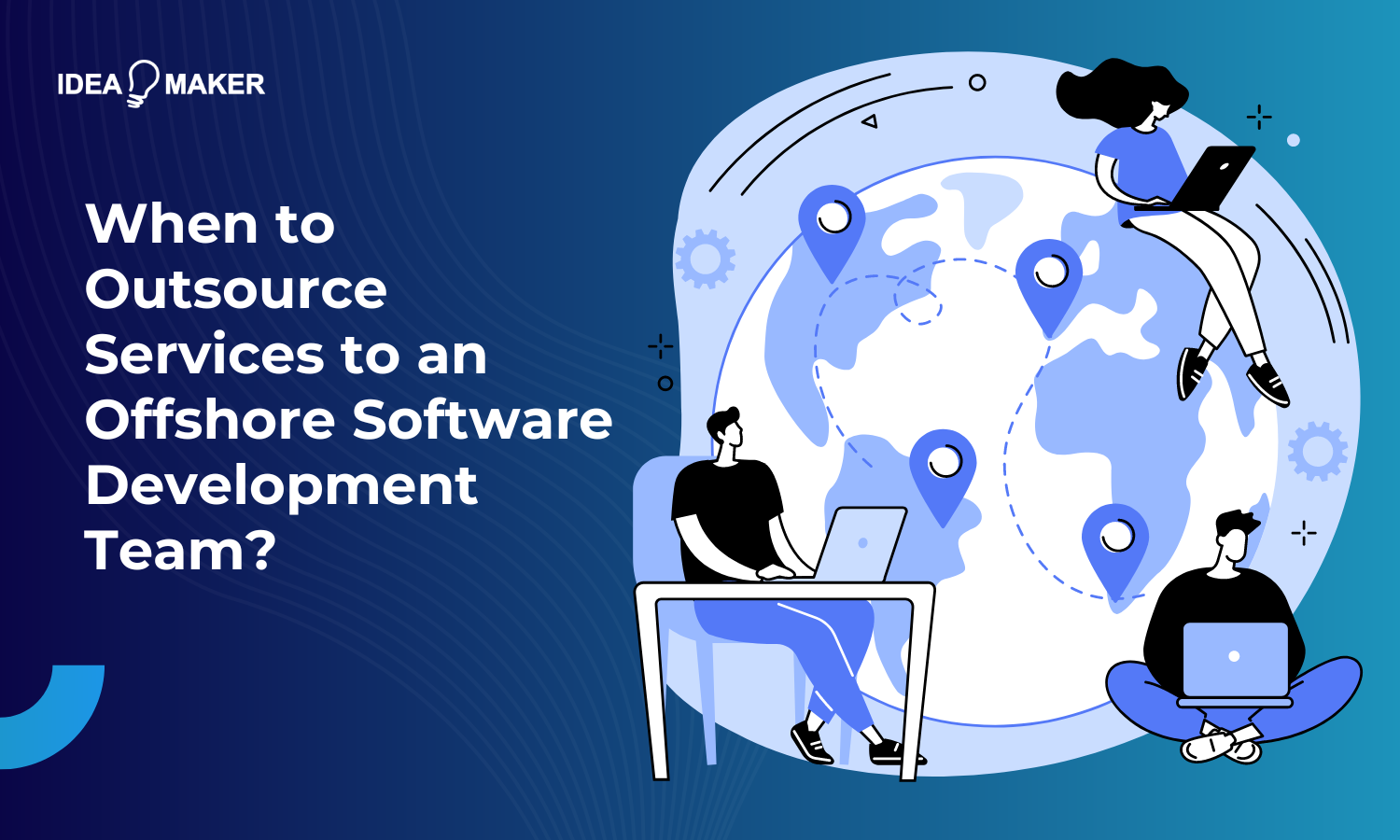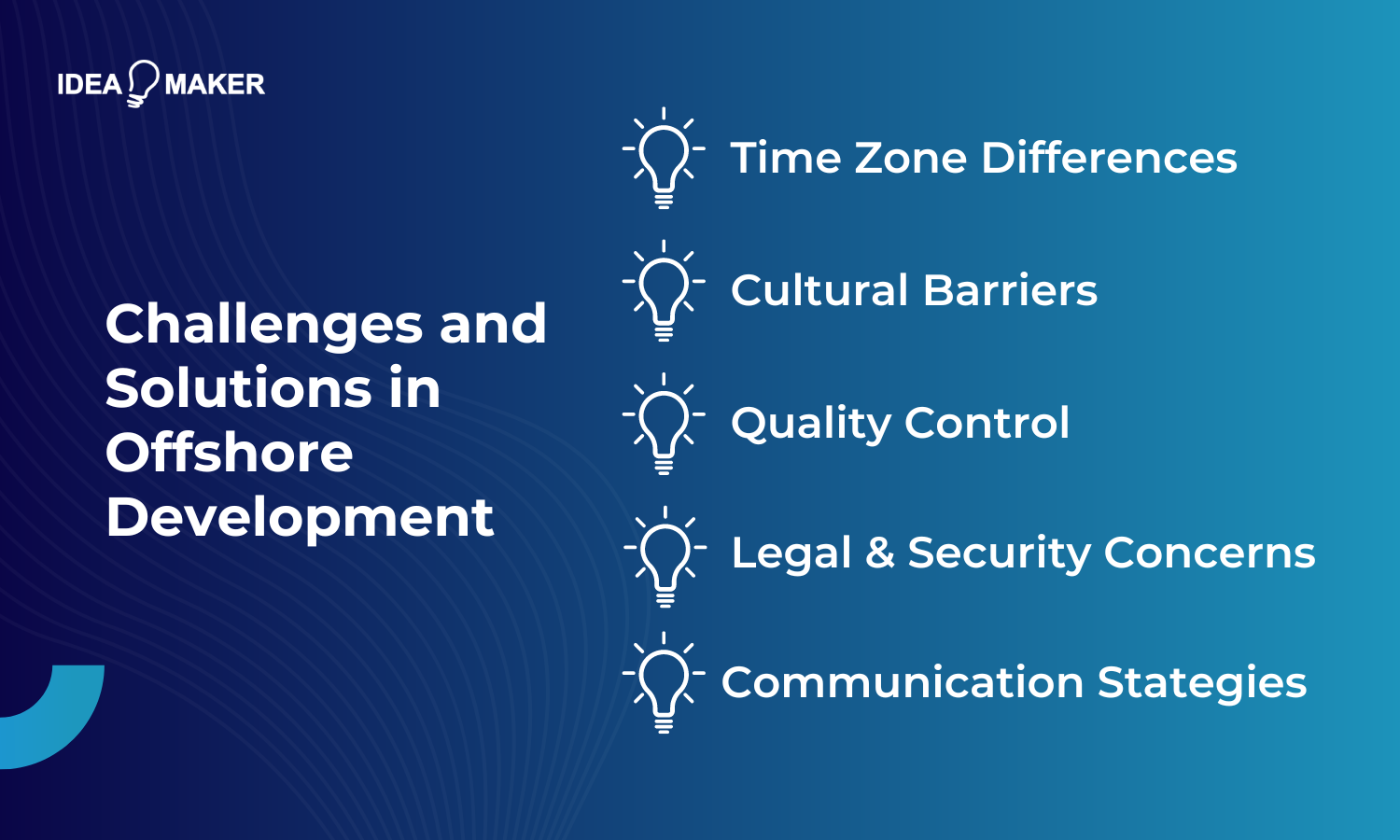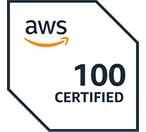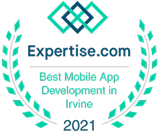Table of Contents
The process of selecting a software development company can be daunting; however, careful consideration is crucial to ensure a high-quality solution that meets your business needs. After all, the success of your software ultimately depends on the developers who build it.
While researching potential candidates, you’ve likely discovered many offshore development companies that offer more competitive rates than domestic teams. This may make you a bit leery, but outsourcing your project to an offshore developer is a viable option.
In fact, the main challenges of hiring an offshore team essentially come down to communication difficulties as a result of time zone differences and language barriers. Nevertheless, with consistency and a little creativity, you can foster a collaborative partnership that prioritizes effective communication.
So, to help you navigate the process of outsourcing, we’ve put together this comprehensive guide that explores the challenges associated with offshore development and offers effective solutions to overcome them.
What Is Offshore Development?
Offshore development refers to the practice of outsourcing software or business processes to a team located in a different country, typically one with lower labor costs. This allows organizations to access specialized skills, reduce operational expenses, and accelerate project timelines by leveraging talent and resources from around the globe. Thanks to these benefits, the offshore development market, which was valued at $122 million in 2021, is rapidly expanding and is projected to reach over $283 million by 2030.
Offshore vs. Nearshore vs. Onshore Models
When outsourcing your project, there are different approaches you can take based on the distance between you and the development team. Understanding these software development outsourcing models will help you determine which option best suits your business.
- Offshore: Offshore outsourcing involves partnering with a software development team located in a distant country, often across different time zones. This model offers significant cost savings but may present challenges related to communication, cultural differences, and time management.
- Nearshore: Nearshore software development outsourcing involves collaborating with a team located in a neighboring or nearby country. This model combines cost-efficiency with improved communication and cultural alignment compared to offshore outsourcing. Nearshore teams are also usually within similar time zones, facilitating real-time collaboration and smoother project management.
- Onshore: Onshore outsourcing involves working with a team located within your same country or region. Although this is typically the most expensive outsourcing option, onshore development offers greater advantages, including easier communication, minimal language barriers, and cultural alignment. As a result, this model is preferred for projects requiring close collaboration, sensitive data handling, or adherence to strict regulatory standards.
What Are the Types of Offshore Models?
Now that you have a better idea of the different outsourcing options, let’s discuss a few of the most popular types of offshore models.
- Project-Based Outsourcing: With project-based outsourcing, specific projects or tasks are outsourced to offshore teams for a defined period. This model offers flexibility, scalability, and cost-effectiveness, making it ideal for short-term initiatives or specialized development projects.
- Dedicated Development Team (DDT): A dedicated development team model involves establishing a long-term partnership with an offshore provider to assemble a team exclusively for your own projects. This model ensures greater control, continuity, and integration with your internal processes, enabling seamless collaboration and efficient resource utilization.
- Managed Services Outsourcing: Managed services outsourcing involves outsourcing the management and operation of specific business functions or processes to offshore providers. This model allows you to focus on core competencies while benefiting from the expertise and efficiency of offshore specialists in areas such as IT infrastructure management, customer support, or back-office operations.
- Build-Operate-Transfer (BOT): The BOT model involves outsourcing only the development and operation of a project to an offshore provider. Once developed, your business then assumes full control and ownership of the offshore team or operation. This model provides a gradual approach to establishing a permanent offshore presence, allowing you to mitigate risks, build capabilities, and maintain strategic control over your offshore operations.
What Type of Services Can Be Outsourced?
There are many services that you can outsource to offshore teams, from software development to customer support. Here are just a few of the most common services that businesses frequently outsource.
- Software Development: Offshore teams specializes in providing custom software development services and in delivering custom software solutions tailored to your unique needs. From web and mobile applications to enterprise software and eCommerce platforms, an offshore team will work alongside you to build bespoke solutions for your business.
- IT Support and Maintenance: Many organizations outsource IT support services, such as helpdesk support, system administration, network management, and software maintenance, to offshore providers. By doing so, your business can ensure optimal performance and reliability of your IT infrastructure.
- Digital Marketing: Offshore teams offer various digital marketing services, including search engine optimization (SEO), pay-per-click (PPC) advertising, social media marketing, content creation, and email marketing. This can help your business enhance your online presence and reach your target audience effectively.
- Data Entry and Processing: By outsourcing data entry, data processing, and data management tasks to offshore providers, your business can improve its efficiency, accuracy, and cost-effectiveness in handling large volumes of data.
- Customer Support: Offshore teams provide customer support services, such as inbound and outbound call center support, live chat support, email support, and ticket management. By outsourcing these services, your business can provide customers with prompt and efficient support resolutions, ultimately boosting satisfaction rates.
- Finance and Accounting: To optimize your financial processes and compliance, your business can outsource finance and accounting functions, such as bookkeeping, payroll processing, accounts payable and receivable management, financial analysis, and tax preparation, to offshore experts.
- Quality Assurance and Testing: Offshore teams offer quality assurance and testing services, including functional testing, performance testing, security testing, and usability testing. This will help ensure your business’ software applications are reliable, secure, and user-friendly.
- Creative Design: Your business can also outsource creative design services, such as graphic design, UI/UX design, illustration, animation, and video production, to offshore designers, to enhance the visual appeal and user experience of your products and marketing materials.
By outsourcing these services to offshore teams, your business can focus on core competencies, reduce operational costs, access specialized skills, and accelerate time to market. This will help you gain a competitive edge in today’s dynamic business environment.
When to Outsource Services to an Offshore Software Development Team?
Outsourcing services to an offshore software development team offers numerous advantages; however, there are certain circumstances that can amplify these benefits. As a result, if your business finds itself in any of the following scenarios, it may be time to hire an offshore developer.
- Cost Optimization: When seeking to reduce operational costs without compromising quality, outsourcing to an offshore team in a cost-effective location can yield significant savings in labor expenses and overhead costs.
- Access to Specialized Skills: When facing skill gaps or the need for expertise in specific technologies or domains, outsourcing to an offshore team with the required skill set and experience can provide access to specialized talent that may be scarce or costly locally.
- Scalability and Flexibility: When experiencing fluctuating project demands or rapid growth, outsourcing to an offshore team allows organizations to scale resources up or down quickly. With this flexibility and agility, your company will always be able to meet evolving business needs.
- Accelerated Time to Market: When aiming to expedite project delivery and gain a competitive advantage, outsourcing to an offshore team can help your organization accelerate development cycles, reduce time to market, and capitalize on business opportunities more swiftly.
- Focus on Core Competencies: When wishing to focus internal resources on core business functions and strategic initiatives, outsourcing non-core tasks enables you to concentrate your efforts and resources on value-adding activities that drive business growth and innovation.
- Global Expansion: When planning to enter new markets or expand operations, outsourcing to an offshore team in target regions can provide valuable insights, cultural expertise, and localization support. This facilitates smoother market entry and expansion strategies, ensuring your business is poised for long-term success.
Essentially, by outsourcing services to an offshore software development team under the appropriate circumstances, your organization can achieve greater efficiency, innovation, and competitiveness in today’s fast-paced and interconnected business landscape. This strategy is particularly effective when you partner with a bespoke software development agency that tailors solutions to meet your specific needs.
Benefits of Offshore Software Development
With 60% of companies outsourcing software development in 2023, offshore development has become increasingly common, especially for businesses seeking to leverage global talent, reduce costs, and accelerate project timelines.
- Cost Savings: Offshore teams located in countries with lower labor costs offer competitive rates, helping your business reduce development expenses significantly compared to hiring local resources. According to Deloitte, 70% of businesses consider this as one of the top benefits of offshore development.
- Access to Global Talent: Offshore software development enables access to a vast pool of skilled professionals from around the world. This access to diverse talent ensures your business can find the right expertise for your project, regardless of geographic location.
- Scalability and Flexibility: The flexible nature of offshore development allows for swift scaling of resources up or down based on project requirements. With this agility, your business can easily adapt to changing needs and allocate resources more efficiently.
- Faster Time to Market: Offshore development teams can accelerate project timelines by working across different time zones. For instance, while your in-house team rests, offshore teams continue progress, leading to around-the-clock development cycles and faster time to market.
- Focus on Core Activities: By delegating non-core tasks to offshore teams, your business can better concentrate on strategic initiatives that drive innovation and growth. This heightened focus on core activities is a crucial advantage of offshore development, as it enhances your competitive edge. In fact, 57% of businesses say this is their primary motivation for outsourcing.
Challenges and Solutions in Offshore Development
As you can see, offshore development offers a myriad of benefits; however, it also presents various challenges. So, let’s dive a little deeper into these challenges and explore some potential solutions.
Time Zone Differences
One of the primary challenges in offshore development involves effectively managing time zone differences in your location and the offshore team’s. After all, misaligned working hours can greatly impact productivity and efficiency by delaying communication, hindering collaboration, and prolonging project timelines.
To address time zone differences, it’s crucial to establish overlapping work hours to ensure a window of time each day for real-time communication and collaboration. You may also want to utilize time zone converter platforms like World Time Buddy and Every Time Zone to help with planning any necessary calls or team meetings. Additionally, by leveraging tools that support asynchronous communication, such as Slack and Loom, teams can successfully maintain continuity and transparency outside of overlapping hours.
Cultural and Language Barriers
When hiring an offshore development team, cultural and language barriers pose significant challenges in terms of communication, teamwork, and overall project success. Differences in work styles, communication norms, and cultural expectations may lead to misunderstandings, lack of alignment, and decreased team cohesion.
To overcome cultural and language barriers, you should prioritize cultural awareness and sensitivity among team members. It’s also a good idea to provide language training and translation services as needed to help bridge language gaps and foster effective communication. Promoting open communication, active listening, and mutual respect will ultimately create an inclusive environment where diverse perspectives are valued.
Quality Control
Ensuring quality control in offshore development can prove difficult due to differences in processes, methodologies, and standards between you and your offshore team. Inconsistent quality assurance practices, lack of oversight, and communication gaps may result in defects, delays, and compromised project outcomes.
Implementing robust quality assurance processes and methodologies is essential to maintain consistency and adherence to quality standards throughout the development lifecycle. For instance, by conducting regular code reviews, automated testing, and manual inspections, you can easily identify and address defects early in the development process.
Legal and Security Concerns
Offshore development involves sharing sensitive information and intellectual property with external parties, raising legal and security concerns. For example, inadequate legal agreements, lack of regulatory compliance, and insufficient security measures may expose your business to data breaches, intellectual property theft, and legal disputes.
Addressing these concerns requires comprehensive risk management strategies and robust contractual agreements, including non-disclosure agreements (NDAs) and service level agreements (SLAs), to protect intellectual property rights and confidentiality.
This means that, when selecting offshore partners, conducting thorough due diligence is vital to ensure compliance with relevant regulations and industry standards. Implementing stringent security measures, such as data encryption, access controls, and regular security audits, will also help safeguard sensitive information and mitigate security risks.
Effective Communication Strategies
When it comes to offshore development, effective communication is key in order to ensure a successful project. Unfortunately, however, language barriers, cultural differences, and time zone disparities often hinder this process, reducing collaboration, clarity, and alignment among distributed teams.
Consequently, implementing clear communication strategies and protocols is imperative to overcome communication challenges in offshore development. This can be done by scheduling weekly meetings to discuss project updates and prioritizing continuous feedback regarding the collaboration process. It’s also important to establish designated communication channels and platforms, such as Slack or Microsoft Teams, to help facilitate the seamless exchange of information and feedback.
Offshore Software Development Process
Offshore software development follows a structured approach to deliver high-quality software solutions tailored to your business needs. From discovery to post-deployment maintenance, this process helps developers ensure each project meets your specific objectives and exceeds expectations. However, there are several factors that you will need to carefully consider for optimal results.
Defining Project Requirements
Defining project requirements involves gathering stakeholder input, documenting functional and non-functional requirements, creating user stories, and validating requirements with prototypes. With this user-centric approach, businesses can minimize ambiguity, mitigate scope creep, and deliver software solutions that meet stakeholder expectations.
Choosing the Right Offshore Model
There are many offshore models to choose from, including project-based outsourcing, dedicated development teams, managed services, and build-operate-transfer models, each of which offer unique benefits. Evaluating these models based on project scope, budget, and long-term strategic goals can help your business optimize resource allocation, minimize risks, and effectively achieve desired outcomes.
Setting Realistic Expectations and Milestones
Setting realistic expectations and milestones early in the development process ensures alignment and transparency throughout the development process. This means defining clear objectives, establishing achievable milestones, and communicating proactively with stakeholders. It’s also essential to manage change effectively and address any concerns promptly to foster collaboration and maintain trust and accountability.
Budget Planning and Cost Management
To ensure the financial viability of offshore development, it’s critical to determine budget allocation, estimate costs accurately, and mitigate cost risks through proactive strategies. By tracking expenses closely, monitoring budget performance, and conducting regular reviews, your business can optimize resource utilization, mitigate financial risks, and achieve desired project outcomes within the constraints of software development budget.
How to Find the Right Software Development Team?
Now that you understand the ins and outs of offshore development, let’s explore how you can find the right team for your project.
Criteria for Choosing an Offshore Development Company
Selecting the ideal offshore development company requires extensively researching their reputation, technical expertise, and resource availability. Effective communication, quality assurance practices, and competitive pricing also play vital roles in the overall decision, as does ensuring legal compliance and compatibility with your project needs. By evaluating these criteria meticulously, you can choose a reliable offshore partner that aligns with your goals and delivers top-notch solutions.
Researching and Shortlisting Potential Partners
Researching reliable potential software development partners involves exploring their portfolios, seeking referrals, and evaluating communication skills. For this, you should consider factors like cultural compatibility and flexibility in engagement models, and ensure alignment on legal and compliance matters. By taking a systematic approach to research and shortlisting, you can identify partners that meet your project requirements and contribute to its success.
Evaluating Technical Expertise and Portfolio
When evaluating technical expertise, it’s best to delve into a company’s portfolio and assess their past projects’ complexity and relevance, looking for innovation, problem-solving skills, and contributions to industry advancements. You will also need to verify team composition and proficiency in relevant technologies. By thoroughly evaluating technical capabilities and portfolio, you can select a partner equipped to handle your project effectively and deliver quality results.
Considering Communication and Language Skills
Communication and language skills are crucial for effective collaboration. As a result, you should strive to find a team with clear communication channels, responsiveness, and cultural awareness. It’s also a good idea to assess the company’s use of project management tools aimed at streamlining communication. By prioritizing transparency and proactive communication, you can foster a collaborative environment and ensure project success.
Understanding Legal and Compliance Aspects
To mitigate legal risks, it’s important to verify contracts, data security measures, and compliance with regulations. You will also need to ensure clear agreements are in place, covering confidentiality and dispute resolution. By addressing legal and compliance matters upfront, you can establish a solid foundation for collaboration and protect your interests throughout the project lifecycle.
Key Tips to Managing Offshore Software Development Team
By implementing these basic tips, you can effectively manage remote software development teams and achieve successful project outcomes.
- Establish Clear Communication Channels: Ensure open and transparent communication channels, utilizing video conferencing, instant messaging, and email to maintain regular communication and address any issues promptly.
- Implement Project Management Tools and Techniques: Utilize project management tools like Jira, Asana, or Trello to track progress, assign tasks, and manage deadlines. Implement agile methodologies such as Scrum or Kanban to promote collaboration and adaptability.
- Foster a Collaborative Culture: Encourage teamwork, knowledge sharing, and cross-functional collaboration by facilitating regular meetings, brainstorming sessions, and team-building activities to strengthen relationships and improve morale.
- Ensure Quality Assurance: Conduct thorough testing, including unit testing, integration testing, and user acceptance testing, to identify and resolve issues early.
- Regularly Monitor and Provide Feedback: Monitor progress regularly and provide constructive feedback to the offshore team. Address any issues or concerns promptly and recognize achievements to motivate the team and maintain momentum.
Benefits of Hiring Idea Maker as Your Offshore Software Development Team?
Partnering with Idea Maker as your offshore software development team offers numerous benefits. These benefits include:
- Expertise in Diverse Technologies: Idea Maker boasts a team of skilled professionals proficient in a wide range of technologies, frameworks, and programming languages. Whether it’s web development, mobile app development, or enterprise software solutions, our team has the expertise to deliver high-quality solutions tailored to your needs.
- Flexible Engagement Models: We offer flexible engagement models tailored to your project requirements and preferences. Whether you need a extended development team, project-based outsourcing, or managed services, we can accommodate your needs and seamlessly adapt to changing project dynamics.
- Proven Track Record: With years of experience in the industry, Idea Maker has a proven track record of delivering successful projects for clients across various domains and industries. Our portfolio showcases our commitment to excellence, innovation, and client satisfaction.
- Transparent Communication and Collaboration: At Idea Maker, we prioritize transparent communication and collaboration with our clients. We ensure regular updates, progress reports, and feedback sessions to keep you informed and involved throughout the development process.
- Quality Assurance and Timely Delivery: Quality assurance is at the core of our development process. We follow rigorous testing methodologies to ensure the highest quality standards and deliver bug-free solutions on time and within budget.
- Dedicated Support and Maintenance: Our commitment to client satisfaction extends beyond project delivery. We provide dedicated support and maintenance services to address any issues, implement enhancements, and ensure the long-term success of your software solution.
If you’re ready to build software that elevates your business, schedule a free consultation with us today.
